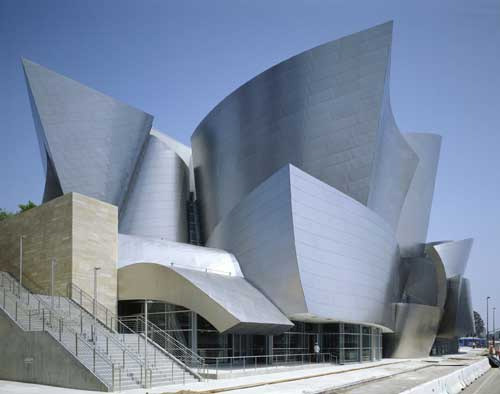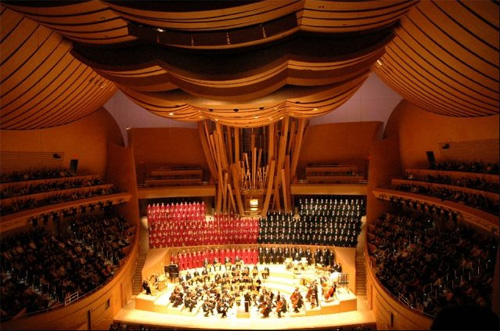
Something New, Something Old
June 2, 2010
I happened to be performing in Los Angeles just as the city’s new and glittering Disney Hall opened several years ago. A week earlier, I called my mother who was living in Southern California to tell her of my arrival. “Oh, wonderful,” she said. “You can take me to Disney Hall.” That was fine with me. Just about everyone was talking about the building itself. I told mother that I would be happy to pick her up in my rented car so that we might look at Frank Gehry’s concert hall cleverly disguised as a Christmas present wrapped in elaborate silver foil. “Look?” My mother, then around ninety years old, sounded put out on the phone. “I don’t want to look. I want to hear. I want to hear a concert in the new hall.” I hung up shaking my head. The chances of getting tickets to any of the first week’s celebratory concerts seemed slim. These would unquestionably be the hottest tickets in town. But to my amazement, there were still a few seats available for one of the concerts—an evening of contemporary music.

“I have good news and bad news,” I told mother. The bad news, of course, was that she would have to listen to new music. My mother, not untypical of many concertgoers, worshiped the old masters—the Bachs, the Beethovens, and the Brahms of the musical world. She complained that contemporary music she heard on the radio sounded unintelligible at best, painful noise at worst. Mother’s idea of a successful concert was one in which she could leave the hall feeling “uplifted” as she liked to put it. Nonetheless, the lure of Disney Hall was such that mother consented to something she had never ever done before: She would subject herself to an entire evening of possibly unpleasant sounds and certainly ones far removed from her beloved three Bs.
A few days later, we sat in Disney Hall waiting for the concert to begin. The hall itself, patterned after the renowned Berlin Philharmonie where the Berlin Philharmonic Orchestra resides, felt familiar to me. I had performed there often over the years. In both halls, the Japanese architect, Yasuhisa Toyota, succeeded in creating an open, welcoming atmosphere with clear sight lines from almost every seat to the stage. As the concert began, it was evident that he had also achieved the most important goal for the new hall. Disney’s acoustics seemed relatively clear, warm, and lively.

The concert consisted of new works performed by first chair players of the Los Angeles Philharmonic Orchestra. Among those presented that day, concertmaster Martin Chalifour performed a thorny yet brilliant Chaconne written by the orchestra’s conductor, Esa-Pekka Salonen, and Peter Stumpf, the principal cellist, played a piece for cello and prepared electronic sounds by a composer whose name I can no longer remember. For a good ten minutes, Peter groaned, moaned, and howled ecstatically on the cello, and the CD player in electronic response groaned, moaned, and howled back at him. At that moment, mother turned to me with a bewildered, almost frightened look on her face. She asked me in a whisper whether I was enjoying the concert.
In fact, I loved the concert. Every work was introduced either by the composer or his or her proxy. Each gave us interesting biographical background and a useful description of the music. Each also provided a kind of comfort zone for the new and foreign sounds and sound patterns that would soon enter our ears for the very first time. The music offered up was by turns fresh, exciting, strange, incomprehensible, provocative, and occasionally downright beautiful. Surely in a Darwinian survival-of-the-fittest sense, not all the music we heard that day would weather the passing of time, but to be a witness to its very moment of birth, and perhaps to be lotto-lucky enough to hear something destined to join the pantheon of masterpieces! That was a heady feeling indeed.
We walked out of Disney Hall each feeling very different about the concert. In this case, I rather than mother was the “uplifted” one. Mother, however, looked clearly unhappy. She demanded to know why music had to sound like this when we had Bach and Mozart and Schubert and all the other old masters. Driving mother home, I had to think that between the two of us, we represented the clashing forces confronting all musicians, listeners, and concert promoters: the need to hear the tried and true as opposed to the equal desire for something new and fresh. Our Guarneri String Quartet, certainly lovers of those old masters that mother clutched to her heart, occasionally felt the need to play music by living, breathing composers. Some listeners complained that we offered much too little of it and yet when we played new music even in a place as sophisticated as New York City, we often received angry letters and threats of subscription cancellations.
Some time after the Disney concert, I brought my mother to a Guarneri concert in which we performed a string quartet by the twentieth century Polish composer Witold Lutoslawski. His music builds striking harmonies from small groups of musical intervals and also uses aleatory methods, in which the rhythmic coordination of parts is subject to the element of chance. Lutoslawski has a wonderful sense for elemental sound and texture. The Quartet, certainly new and unsettling for its time (1964), in turn twitters, sighs, mourns, moans, and roars.
When the concert finished, Mother marched back stage and confronted John Dalley as he was packing up his violin. “John, what do you see in this music”, she demanded to know. John smiled at her good-naturedly. “Pearl, you’ve got to give this kind of music some time.” My Mother, then well over ninety, looked at him sharply. “John,” she said shaking her head sadly, “I don’t have that much time.”
Subscribe
Sign up to receive new stories straight to your inbox!





































































































































































Comments
It is good to read this jewel of a vignette. I loved it when first I read it, and it is even more delicious on second reading.(Joe Vita).
It is 4:40 in the morning and I’m listening to your playing J.S. Bach’s Chaconne. It clears the head and opens up the day. I don’t think it warms the air, but it warms the heart and lifts the spirit. It will stay with me throughout the day — a gift.
Thank you.
Thanks so much for your lovely comments, Hava, but shouldn’t you be getting some sleep???
Hugs,
Arnold
Dear Arnold – I hope you remember me (ret. National Symphony Concertmaster) from our last meeting a few years ago. If you feel so disposed would you send me your Email address? I would like to write you a few words, and perhaps send you something with your old Cleveland friends on it. I really would very much enjoy keeping in touch with you.
Cheers, Bill Steck
Leave a Comment
*/